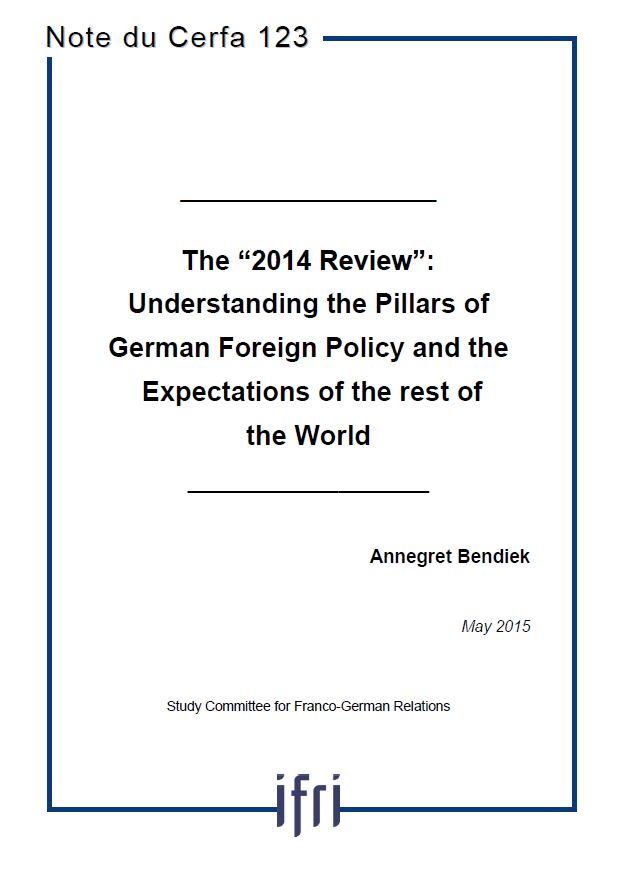The “2014 Review”: Understanding the Pillars of German Foreign Policy and the Expectations of the Rest of the World

German foreign policy is today confronted with a number of fundamental challenges. The country has become larger and has again become strong economically and must no longer content itself with its former role as France’s political junior partner in Europe or the United States’ junior partner in the world. At the same time, Berlin is far from being fully prepared for taking over this new role – deficits are both strategic and conceptual.

Neither the political class nor the media, not to mention the German society, holds concise ideas about German interests in Europe and the world beyond the promotion of peace and justice.
Germany’s political class has not failed to take note of this unsatisfactory situation. As one of the first measures of his new and second term in office, foreign minister Steinmeier announced in 2013 the “self-reflection on the perspectives of German foreign policy” (Steinmeier 2013), which was translated into the “Review 2014 – Außenpolitik Weiter Denken” project.
The debate on Germany’s future foreign and security policy has, however, only just begun. The Review did certainly not end it, but represents merely a snapshot of the longer process during which the country will outgrow its postwar role as France’s and the United States‘junior partner. The Review itself can only in a limited way provide an answer to the question of in which direction this reorientation should happen and how far it should go.
Annegret Bendiek is Senior Associate at the research group "EU/Europe" at the German Institute for International and Security Affairs (Stiftung Wissenschaft und Politik). Between April and October 2014 she was part of the Policy Planning Staff at the German Ministry of Foreign Affairs.
Download the full analysis
This page contains only a summary of our work. If you would like to have access to all the information from our research on the subject, you can download the full version in PDF format.
The “2014 Review”: Understanding the Pillars of German Foreign Policy and the Expectations of the Rest of the World
Related centers and programs
Discover our other research centers and programsFind out more
Discover all our analysesThe Franco-German Brigade and the Revival of European Defense
One thing has been clear since Donald Trump's return to the White House: the very existence of the European unification project is threatened. Unless it develops a sovereign defense policy to counter the war in Ukraine and the weakening of American security guarantees, the European Union will continue to see its internal cohesion and external attractiveness wane.
Friedrich Merz and the Zeitenwende 2.0. A “New Era” for Transatlantic Relations?
On February 23, 2025, almost 60 million voters were called upon to elect a new Bundestag. These elections will also give rise to a new government in Europe's largest economy.
After the Elections: Germany in Search of Shaken Stability?
With a voter turnout of 82.5%, Germany recorded its highest participation since 1987—an increase of 6.1 percentage points compared to 2021. As in the previous election, the high turnout particularly benefited the Alternative for Germany (AfD), which was able to mobilize many former non-voters. Many voters sought to punish the outgoing government with their ballots, as its approval rating had dropped to just 14% before the coalition broke apart in November 2024. Germany is now very likely heading toward a grand coalition between the CDU/CSU and the SPD, with exploratory talks having begun on February 28.
The German Greens as an Alliance Party: The End of an Illusion?
At the Wiesbaden Congress in November 2024, Robert Habeck, currently Minister for the Economy and Climate, was nominated as the Green Party’s candidate for the Chancellorship in the early parliamentary elections on February 23, 2025. The party, founded 45 years ago, is now firmly established in the German political landscape. Wishing to turn the page on an unloved ‘‘traffic light’’ coalition, the party is banking on a personal campaign and an optimistic discourse based on the energy transition and social justice.









